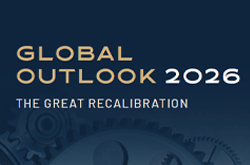COVID-19: Impact on fiscal balances and government debt in the next decade

Monthly House View - May 2020 - Download an excerpt here
There are mounting questions behind the significant rise of fiscal and monetary policy decisions designed to limit the economic consequences of the COVID-19: Are these measures temporary? What will be the impact on fiscal balances and government debt in the next decade? Is globalisation over?
The magnitude of the measures is the mirror of the significant hit of the lockdown measures on our economies. What is also spectacular is to observe that after four decades of unwinding of regulations and the state’s economic and social interventions, it took only a month to implement significant safety nets for individuals and corporates.
Beyond the magnitude of the policy response, the similitude between the concepts and words today with the speeches from the Great Depression, the Second World War and its aftermaths lead us to think that we may be experiencing a more structural than temporary shift in economic policies.
Indeed, if governments need to bail-out airlines, energy or automotive companies twelve years after having bailed out banks, this is a signal that states are unsure of a permanent reinsurance function of economic cycles. And if governments are to send helicopter money to jobless people or to companies to avoid unemployment, we are indeed back to the Welfare State. This does not come as zero cost. In the public opinion’s eye, it would be hard to justify that companies buy back their own shares and leverage their balance sheet in the expansionary phase and beg for state aid in recessive phases. So, we should work with the assumption that returns may diminish either through more frugality on buybacks and dividends, or through higher taxes.
Obviously this will increase polarisation between companies and sectors, and technology companies are emerging as the winners of this crisis, as reflected by their recent performance. On the contrary, one could question if the adoption of home office triggers questions on the value of city-centre office space.
The problem that emerges afterwards is how states will finance their debt. Practically, it is politically and economically impossible to raise taxes today. But from an arithmetic standpoint, an increase of taxes seems likely in the next decade. Since countries will continue competing to attract companies, it is likely that corporate tax should remain low. So there is obviously a risk that households will be taxed more, and VAT is generally the easy way to do this. However, in a world of rising social inequalities and climate change issues, some governments could be tempted to solve this equation with a tax on carbon.
Beyond the magnitude of the fiscal stimulus, what is striking is the growing idea that a nation’s sovereignty also lies in its capacity to domestically produce the essential goods to cover the basic needs of its population, including food, vaccines and drugs and healthcare devices. This could lead to some changes in the perceived benefits of globalisation in the political debate of the next elections.
Life and investments after COVID-19 may be quite different and it is not necessarily bad news after all.
Monthly House View, 24/04/2020 release - Excerpt of the Editorial
May 04, 2020




